|
 On a few pages short examples of music will start playing automatically
after the download is ready, but only if Microsoft Internet Explorer
is your browser. Mozilla Firefox, Safari and Google Chrome do not
have the facility to let you hear sound in the background.
On a few pages short examples of music will start playing automatically
after the download is ready, but only if Microsoft Internet Explorer
is your browser. Mozilla Firefox, Safari and Google Chrome do not
have the facility to let you hear sound in the background.
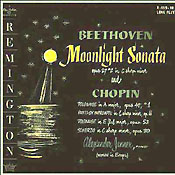
Alexander
Jenner's recording: Beethoven and Chopin.
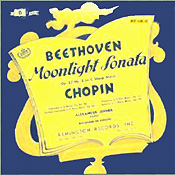
The
first release from 1950.

The
reissue on the Vibraton label.

The
release of Alexander Jenner's Moonlight Sonata on Plymouth P-12-16
coupled with Alfred Kitchin's Pathétique.
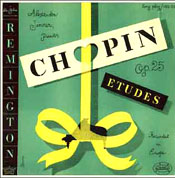
The
Remington cover of Jenner's youthful and vital performance of the
Etudes Op. 25 of Chopin. The Etudes were later released on Plymouth
coupled with the Chopin pieces from R-199-10.


On
Bertelsmann Schallplattenring 8135 a variety of Remington artists
can be heard: Wolfgang Sawallisch, Alexander Jenner, Karl Rucht and
Laszlo Halasz.
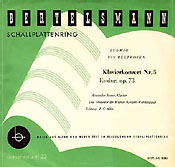
In
the mid nineteen fifties Alexander Jenner's recording of Beethoven's
Fifth Concerto was released on LP 11033 of Bertelsmann Schallplattenring
and found its way to the homes of the many subscribers to this mail-order
record company. The Orchestra of the 'Wiener Konzert-Vereinigung was
directed by F.C. Adler.
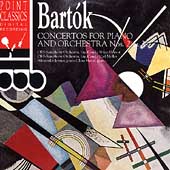
The
Point Classic CD with the Concertos Nos. 2 and 3 of Béla Bartók.

Alexander Jenner today.
(Image courtesy Alexander
Jenner.)



|
In
1949, pianist Alexander Jenner won the "Bösendorfer-Preisflügel",
the grand piano awarded by the famous Viennese piano manufacturer
to the best student of that year graduating from the Vienna State
Academy of Music. This fact and early performances put him in
the limelight. No wonder he was asked by Marcel Prawy to make recordings
for the Remington label.
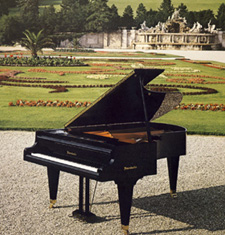 Viennese
impressario
Marcel Prawy
acted on behalf of Don Gabor to produce recordings. Only in a few
cases he would obtain existing radio recordings. Most of the time
he himself arranged recording sessions with specific artists and orchestras.
All to be released on the Remington label. Viennese
impressario
Marcel Prawy
acted on behalf of Don Gabor to produce recordings. Only in a few
cases he would obtain existing radio recordings. Most of the time
he himself arranged recording sessions with specific artists and orchestras.
All to be released on the Remington label.
Prawy
also made deals with young artists who just had finished their studies
in Vienna. He discovered and contracted pianist Jörg Demus for
several recordings. Prawy also approached young Alexander Jenner:
"Mr. Prawy would ask you to study, say Beethoven's 'Diabelli
Variations', and to be ready in two weeks time for a recording session."
The sessions arranged by Prawy in 1950 produced material to be released
not only on Remington (on which also pianists Frieda Valenzi, Felicitas
Karrer, Hilde Somer, Friedrich Wührer, Hermann Schwertmann, and
Fritz Weidlich played) but the recordings were often released on Gabor's
Plymouth and Merit labels as well.
Alexander
Jenner
(Vienna - April 4th, 1929) studied from 1945 on for almost ten years
at the "Musikakademie" in Vienna. During the first three years with
Paul Weingarten, and the years after with Bruno Seidlhofer and Richard
Hauser.
|
|
|
Alexander
Jenner in the early years of his career when he won prizes,
played jazz with Friedrich Gulda and Joe Zawinul, and recorded
for the Remington label.
Image courtesy Alexander Jenner.
|
In
1951 Jenner won the second price at the International Contest of
Geneva (a first prize was not given), and the following year a
second prize at the Viotti Contest in Vercellie (other contestants
were René Pouget from France, Walter Blankenheim from Germany
and Andrej Wasowski from Poland). In that same year he won the "Kranichstein
Music Award for Modern Music Interpretation" (Kranichsteiner Musikpreis
für Neue Musik-Interpretation) in Darmstadt. No wonder Prawy
asked him to record for the Remington label while still further studying.
After
he had completed his studies in 1957 he participated in yet another
competition: The Rio de Janeiro Contest for Pianists. Other
participants were Sergei Dorensky, Augustin Anievas, Michael Voskresensky,
Nelson Freire and a very young Arthur Moreira-Lima. Jenner won First
Prize and the jury was unanimous in that vote.
In
those years Alexander Jenner not only played the classics but also
performed music which was not considered standard repertory at the
time. He was the first Austrian pianist to perform Gershwin's
Rhapsody in Blue and Concerto in F (February 24, 1951) and he gave
the first performance of Strawinsky's 'Petrouchka for Piano
Solo'. As early as 1951 he gave the first performance of the 12 tone
compositions of Hanns Jelinek.
Jenner
gave the first performance in Austria of the Concerto for Piano and
Orchestra of Aram Khatchaturian. He performed this concerto
also with Khatchaturian conducting. It gave Jenner the opportunity
to discuss the intentions of the composer and the way the Concerto
was to be played.
The
performance of the Khachaturian Concerto on Classique 11353 / Orbis
81503 clearly shows an approach which differs substantially from
the known recordings of Moura Lympany, Leonard Pennario, Mindru Katz
and Peter Katin, to mention a few. In Jenner's recording the pianist
puts an emphasis on the modernity of the composition. There are accents
not heard in other recordings before. In his recording the Concerto
is less folkloristic and becomes a more serious work of a higher level
one could say. Alexander Jenner is the virtuoso who masters the technique
extremely well. The playing of the cadenzas in all three movements
is exemplary. The beginning of the second movement lets one hear that
the pianist is familiar with the jazz idiom and though there is a
precision about his playing, the setting of the mood is right and
the intensity is very good, though - again - it differs from the recordings
by pianists who sport a more popular, melodic approach. This is nevertheless
a remarkable performance which can be fully enjoyed.
Alexander
Jenner's interest in modern music is exemplified by his participation
(together with Ensemble "die reihe") in the recording
of the "Zwolftonwerke" (12 Tone Music) of Hanns Jelinek,
supervised by Friedrich Cerha, and by his performance of the
"Castelli Romani" of Austrian composer  Karl Marx on March
28/29, 1982, in the Stefaniensaal of Graz, with the Graz Philharmonic
Orchestra conducted by Peter Schrottner; and by his recording of the
Bartok Concertos. This despite the fact that the classics from the
romantic period - Beethoven, Chopin, Schubert, Schumann and Grieg
- dominate his repertory. He performed these composers as a soloist
with the leading orchestras of Europe: Vienna Philharmonic, Munich
Philharmonic Orchestra, London Symphony Orchestra, Royal Philharmonic
Orchestra and Staatskapelle Dresden.
Karl Marx on March
28/29, 1982, in the Stefaniensaal of Graz, with the Graz Philharmonic
Orchestra conducted by Peter Schrottner; and by his recording of the
Bartok Concertos. This despite the fact that the classics from the
romantic period - Beethoven, Chopin, Schubert, Schumann and Grieg
- dominate his repertory. He performed these composers as a soloist
with the leading orchestras of Europe: Vienna Philharmonic, Munich
Philharmonic Orchestra, London Symphony Orchestra, Royal Philharmonic
Orchestra and Staatskapelle Dresden.
He traveled to Poland, the Czech Republic, Yugoslavia, Croatia, and
Italy. He performed in Brazil and Japan and gave concerts with Claudio
Abbado, Zubin Mehta, Christoph von Dohnányi,  Wolfgang Sawallisch, Vaclav Neumann,
Mariss Jansons, Isaac Karabtchevsky, and in his early years with legends
like Ernest Ansermet, Josef Krips, Milo von Wawak, Volkmar Andreae,
Paul Kletzki, Rudolf Kempe and Hans Swarowsky.
Wolfgang Sawallisch, Vaclav Neumann,
Mariss Jansons, Isaac Karabtchevsky, and in his early years with legends
like Ernest Ansermet, Josef Krips, Milo von Wawak, Volkmar Andreae,
Paul Kletzki, Rudolf Kempe and Hans Swarowsky.
In
1969, at the age of 40, Alexander Jenner became a professor at the
"Wiener Musikhochschule"; he conducted master classes and gave courses
in Austria, Japan, Germany, USA, Taiwan, Spain and Latin America.
He also is a valuable juror at international piano competitions and
he judicated at various competitions, Beethoven (Vienna), Tchaikovsky
(Moscow), Chopin (Warsaw), Busoni (Bolzano), Schubert (Dortmund),
and Schumann (Zwickau), and the Hamamatsu Competiton and other contests
organized in Munich, Tokyo, Cologne, Petria, Sydney and Nagoya. He
received and accepted invitations for the Enesco Competition (2001)
in Bucharest and the Rachmaninoff Competition in Moscow (2002). Alexander
Jenner has been honored with many national and international orders
of merit.
When
I talked to Alexander Jenner, he told me about the role of Marcel
Prawy regarding the Remington recordings and he confirmed: "Yes, I
only made two recordings for Remington".
His
discography is an interesting list of recordings of works in various
styles. It also deserves mention of the recordings of Bartók's
Piano Concertos Nos. 2 and 3, released on Compact Disc.
Alexander
Jenner's discography on Donald Gabor labels:
Remington
RLP-199-10: Moonlight Sonata (Ludwig
van Beethoven), Polonaise No. 1, Fantasie Impromptu, Polonaise Op.
53 and Scherzo Op. 39 (Chopin).
On older covers the name of Helmut Roloff is mentioned instead of
Alexander Jenner as pianist of the Beethoven Sonata while the performer
is Alexander Jenner.
Jenner's performance of the Moonlight Sonata was also released on
Plymouth P-12-16 in a coupling with Sonata Pathétique played
by Alfred Kitchin.
Under the heading 'Chopin Melodies' another Plymouth release (P12-20)
contained Jenner's recordings of two Polonaises, Fantasy Impromptu
and Etudes Op. 25. Much later the Etudes were issued on the Paris
label. The pianist's name had been changed into Robert Garand, probably
because the license had expired.
The adagio of the Moonlight Sonata was released on a Bertelsmann
Schallplattenring 10" disc called "Wunschkonzert - Meisterwerke
der Klassik". The liner notes state that Alexander Jenner is
one of the few pianists who unconditionally surrenders himself to
this difficult Beethoven composition. That same disc features a Chopin
Nocturne which was never released on Remington.
Remington
R-199-28: Etudes
Op. 25 (Frederic Chopin).
Warren DeMotte characterized the performances of these studies with
"Jenner is warm and probing."
And music critic  Cecil Smith wrote in New Republic,
April 23, 1951:
Cecil Smith wrote in New Republic,
April 23, 1951:
"Jorg
Demus and Alexander Jenner, neither of whom I ever heard of,
appear to be the best of Remington's pianists. (...) Mr.
Jenner offers sensitive and attractive performances of the Chopin
Etudes Op. 25. In all these records the piano sounds reasonably
well, though not as well as it can in the best full-price products."
|
|
|
Click
here
for a Sound Clip of Alexander Jenner playing Etude Op. 25 No.12
- Ocean Etude - from 1950. This file will be replaced as soon
as a better copy of the record will be available.
|
|
Alexander
Jenner on other labels:
Impression
6032 (Special Edition): Sonata Pathétique, Moonlight Sonata,
Appassionata (Ludwig van Beethoven).
AKM
419 557: Compositions of Dieter Kaufmann
- "Concertomobil für Violine, Tonbänder und Orchester" -
Concertomobile for Violin, Tapes and Orchestra (with Saschko Gawriloff,
violin and the Symphony Orchestra of the Südwestfunk Baden-Baden
conducted by Ernest Bour), "Für Clara" (Alexander Jenner,
piano, and the 'Niederösterreichisches Tonkünstlerorchester'
Wien conducted by Alexander Rahbari), "Trois Poèmes de
Stéphan Mallarmé for voice and 5 instruments" (Noriko
Sasaki, soprano, the Austrian Ensemble for New Music, Klaus Ager,
conductor) .
Bertelsmann
13357 / World Record Club TP 63 / Mace S-9064: Piano Concerto
in A minor (Edward Grieg), Alexander Jenner with the Bavarian Radio
Orchestra conducted by Odd Gruner-Hegge. Two Elegiac Melodies for
String Orchestra with Friedrich Tilligant conducting the Southwest
German Chamber Orchestra.
Bertelsmann
Schallplattenring Nr. 11033: Piano
concerto No. 5 Op. 73 (Ludwig van Beethoven) with the Orchestra of
the Vienna Concert Society, F. C. (Frederick Charles) Adler, conductor.
Although Bertelsmann Schallplattenring had a contract with Don Gabor,
this recording was not made in cooperation with Remington.
Classique
11346 K: Sonatas No. 2, Op. 35, and No. 3, Op. 58 (Frederic Chopin).
Ariola
11358 K / Realm RM 161 (Oriole Records, London) / World Record Club
ST 213: Piano Concerto No. 2 (Johannes Brahms) with Dean Dixon
conducting.
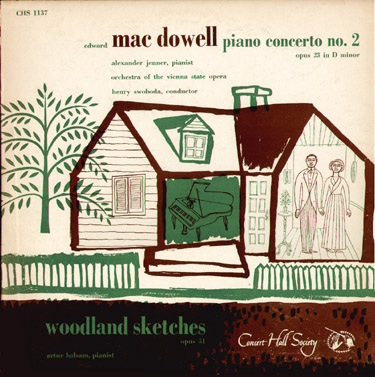
Concert
Hall Society CHS 1137:
Piano Concerto No. 2 (MacDowell) with Henry Swoboda conducting the
Vienna State Opera Orchestra. This recording was noted for the very
good performance of this rarely performed concerto. The disc also
contains Woodland Sketches performed by pianist Arthur Balsam. When
evaluating the performance of the Concerto  Warren
DeMotte wrote in 1955: "Jenner-Swoboda are spirited
in a crisp recording".
Warren
DeMotte wrote in 1955: "Jenner-Swoboda are spirited
in a crisp recording".
The
disc was released in April 1952 and for two years was the only performance
on record of this concerto until the recording of the Festival Concert
Orchestra on Camden, the disc with Jesús María Sanromá
and Howard Hanson on Columbia, and Vivian Rivkin with Dean Dixon on
Westminster became available in early 1954. Jenner's disc was announced
to be deleted in June 1957 when the brothers David and Samuel Josefowitz
had sold the  Concert
Hall Society label to Crowell-Collier and concentrated on
the Musical Masterpiece Society subscription series instead. Concert
Hall Society label to Crowell-Collier and concentrated on
the Musical Masterpiece Society subscription series instead.
Classique
11353 / Orbis 81503:
Piano Concerto (Aram Khatchaturian) with conductor Kurt Richter.
|
|
|
The
cover of the Classique release of Aram Khatchaturian's Piano Concerto
with the pianist's hands.
|
Amadeo
AVRS 3004:
4 Pieces Op. 96, 3 Etudes Op. 54 (Norbert Sprongl)
Amadeo
AVRS 5062/63: Zwölftonwerk Op. 15 (Hanns Jelinek); with ensemble
"die reihe"
PAN
0120 390 B: Gaspard de la nuit (Maurice Ravel), Ballade No. 1
Op. 23 (Frederic Chopin), Mephisto Walz (Franz Liszt)
|
|
|
Alexander
Jenner at 51 playing Gaspard de la Nuit (Ravel), Ballade Op. 23
(Chopin) and Mephisto Waltz (Liszt) on PAN 120 390, recorded May
5 and 6, 1980.
|
Classical
Excellence CE 11023:
Piano Concerto No. 20 (Wolfgang Amadeus Mozart). ORF (Austrian Radio)
Symphony Orchestra conducted by Milan Horvath.
Point
Classics 267007 (CD): Piano concertos Nos. 2 and 3 (Béla
Bartók) with The Austrian Radio Symphony Orchestra conducted
by Milan Horvath and Karl Melles respectively.
Many
recordings like his Beethoven, Bartok and Khatchaturian
received praise, and especially his performance of the hardly ever
played MacDowell concerto was outstanding.
He participated in the publication of the "Beethoven Piano
Sonatas, edited and published from the originals by Peter Hauschild,
and finger notation by Alexander Jenner", Wiener Urtext Edition,
Copyright 1997, Vienna.
 Alexander Jenner playing Jazz.
Alexander Jenner playing Jazz.
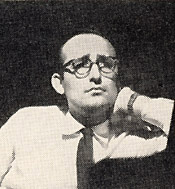 It
was Alexander Jenner - playing in the Viennese art-club "Strohkoffer"
- who, at the end of the nineteen forties, introduced Friedrich
Gulda (1930-2000) to the essence and joys of the jazz idiom.
He often played four hands boogie woogie with Friedrich Gulda. It
was Alexander Jenner - playing in the Viennese art-club "Strohkoffer"
- who, at the end of the nineteen forties, introduced Friedrich
Gulda (1930-2000) to the essence and joys of the jazz idiom.
He often played four hands boogie woogie with Friedrich Gulda.
Many
young artists, celebrities and amateurs visited the club. "One
evening", Jenner recalls, "a young man came in and said: 'I
like to play something too...' (in Viennese dialect: 'I mech
aa was spüle...').
Jenner: "They let him play, and instantly eyes and ears
of everybody present were opened in amazement for he played
in the most modernistic, energizing jazz style." This young
man was Joe (Josef) Zawinul, the all-round jazz musician,
who later went to live in the United States and rose to fame.
Joe
Zawinul and Alexander Jenner, as "Vienna Piano Duo",
recorded two 78 RPM shellac discs for His Master's Voice: Fine
and Dandy, September in the Rain, Pick Yourself Up, and Stompin'
at the Savoy. In 1953 that was when 78 RPM was still a widespread
format.
|
Mr.
Jenner also played under his pseudonym Sascha Janus, Sascha
being his Christian name in Russian of Alexander, and Janus the double-faced
mythological figure (signifying classical music and jazz), and which
is also the name from which his family name stems. (Etymology: Jannarius
> Jänner > Jenner).
Dr.
Aydin Karlibel, composer-pianist, active at the Istanbul State Opera
Istanbul, Turkey, attended Prof. Jenner's classes from 1990 till 1993
in Vienna.
Professor
Jenner also visited Istanbul and performed a Beethoven Concerto under
the eminent Turkish composer-conductor-pianist-pedagogue Cemal Resid
Rey (known to the French as Djemal Rechid), who lived from 1904-1985.
Alexander
Jenner still teaches young talents, conducts master classes and adjudicates
international contests and competitions.
Professor Jenner lives in Vienna.
R.A. Bruil, July
2001
|

